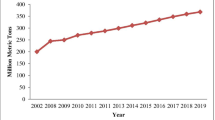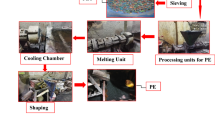Abstract
This work investigates the possibility of improving the physical, mechanical, and microstructural performance of porcelain tile using a filter-press cake waste of a ceramic-tile factory. Before firing at the factory, the wastes (defective pre-products) formed in raw-material preparation, polishing–cutting lines, and after the glazing application accumulated in the sludge formed in the pools in the ceramic-tile factories. A waste cake mixture (WM) was prepared according to the daily production amounts in these pools; physical and chemical properties were investigated. For this purpose, sixteen different series of tile compositions have been prepared by replacing the clays and kaolin with the WM at 3, 6, 9, and 13% by weight. When the prepared samples are compared to a standard, the samples containing 6 wt% WM show high bending strength due to the high amount and relative aspect ratios of the needle-like mullite crystals, and firing shrinkage, water absorption, and color parameters values remained almost constant. The study reveals that the addition of 6 wt% WM in porcelain tiles results in about a 41% increase in strength. The WM is a potentially alternative material to be successfully recycled in the eco-friendly porcelain tile compositions as a partial replacement of clays and kaolins up to 13% level.











Similar content being viewed by others
Data availability
Not applicable.
References
Adiyaman YH (2006) The possible use of Etibor A.Ş. Hisarcik company’s wastes in porcelain stoneware fabrication. Master thesis, Eskisehir Osmangazi University, Turkey
Aydin T, Tarhan M, Tarhan B (2019) Addition of cement kiln dust in ceramic wall tile bodies. J Therm Anal Calorim 136:527–533. https://doi.org/10.1007/s10973-018-7615-y
Bayer OZ, Atay B, Cakı M, Ay N (2015) An investigation of color development by means of the factorial design in wall tile glazes with ferrochromium fly ash. Indian J Eng Mater Sci 22:215–224
Bayer Ozturk Z (2016) Microstructural characterization of mullite and anorthite-based porcelain tile using regional clay. J Ceram Process Res 17:555–559
Bayer Ozturk Z, Ay N (2012) An investigation of the effect of alkaline oxides on porcelain tiles using factorial design. J Ceram Process Res 13:635–640
Bayer Ozturk Z, Eren Gultekin E (2015) Preparation of ceramic wall tiling derived from blast furnace slag. Ceram Int 41:12020–12026. https://doi.org/10.1016/j.ceramint.2015.06.014
Binal G, Ay N (2015) The usage of magnesite production wastes in ceramic tile bodies. J Aust Ceram Soc 15:107–111
Celik H (2010) Technological characterization and industrial application of two Turkish clays for the ceramic industry. Appl Clay Sci 50:245–254. https://doi.org/10.1016/j.clay.2010.08.005
Cigdemir G, Kara A, Kara F (2010) Effect of earth alkaline oxides on firing behaviour of porcelain stoneware. Ind Ceram 30:177–186
Das SK, Dana K, Singh N, Sarkar N (2005) Shrinkage and strength behaviour of quartzitic and kaolinitic clays in wall tile compositions. Appl Clay Sci 29:137–143. https://doi.org/10.1016/j.clay.2004.10.002
de Noni JA, Hotza D, Soler VC, Vilches ES (2010) Influence of composition on mechanical behaviour of porcelain tile. Part I: microstructural characterization and developed phases after firing. Mater Sci Eng A 527:1730–1735. https://doi.org/10.1016/j.msea.2009.10.057
de Noni JA, Hotza D, Soler VC, Vilches ES (2008) Influence of porcelain tile starting composition on tile microstructure and mechanical properties. Qualicer, Castellon, Spain, pp 61–73
Dwivedi A, Singh KN, Hait M et al (2022) Ferroelectric relaxor behavior and dielectric relaxation in strontium barium niobate- a lead-free relaxor ceramic material. Eng Sci 20:1–8. https://doi.org/10.30919/es8d760
Folgueras MV, Marana Feijaon JP, da Rosa FG et al (2000) The use of blast-furnace slag and fly ash for producing glass-ceramics by sintering. Castellon, Spain, pp 151–152
Hamid NB, Azmi MAM, Abdullah NH et al (2021) A review: potential of waste materials in tiles production. Multidiscip Appl Res Innov 2:91–102
Kayaci K, Yildirim Y, Genc C et al (2019) Investigation of the possibilities of using cake and ceramic sanitary ware fired cracked wastes in porcelain tile bodies of ceramic tile factories. Afyon Kocatepe Univ J Sci Eng 19:353–358
Khalil NM (2014) Exploitation of the ceramic wastes for the extraction of nano aluminum oxide powder. J Ind Eng Chem 20:3663–3666. https://doi.org/10.1016/j.jiec.2013.12.063
Khater HM, El-Nagar AM (2020) Preperation of sustainable of eco-friendly MWCNT-geopolymer composites with superior sulfate resistance. Adv Compos Hybrid Mater 3:375–389. https://doi.org/10.1007/s42114-020-00170-4
Kurama S, Kara A, Kurama H (2007) Investigation of borax waste behavior in tile production. J Eur Ceram Soc 27:1715–1720. https://doi.org/10.1016/j.jeurceramsoc.2006.05.014
Lu HX, He M, Liu YY et al (2011) A preparation and performance study of glass–ceramic glazes derived from blast furnace slag and fly ash. J Ceram Process Res 12:588–591
Ma R, Cui B, Hu D et al (2022) Enhanced energy storage of lead-free mixed oxide core double-shell barium strontium zirconate titanate@magnesium aluminate@zinc oxide-boron trioxide-silica ceramic nanocomposites. Adv Compos Hybrid Mater 5:1477–1489. https://doi.org/10.1007/s42114-022-00509-z
Macedo Neto JC, Nascimento NR, Bello RH et al (2022) Kaolinite review: intercalation and production of polymer nanocomposites. Engineered Science 17:28–44. https://doi.org/10.30919/es8d499
Martin-Marquez J, Rincon JM, Romero M (2010) Effect of microstructure on mechanical properties of porcelain stoneware. J Eur Ceram Soc 30:3063–3069. https://doi.org/10.1016/j.jeurceramsoc.2010.07.015Get
Menezes RR, Ferreira HS, Neves GA et al (2005) Use of granite sawing wastes in the production of ceramic bricks and tiles. J Eur Ceram Soc 25:1149–1158. https://doi.org/10.1016/j.jeurceramsoc.2004.04.020
Ozturk B (2017) Effect of addition of Avanos’s (Nevsehir) clays on the physical and microstructure properties of ceramic tile. J Aust Ceram Soc 53:101–107. https://doi.org/10.1007/s41779-016-0014-6
Romero M, Perez JM (2015) Relation between the microstructure and technological properties of porcelain stoneware. Rev Mater Constr 65:e065. https://doi.org/10.3989/mc.2015.05915
Sarkar R, Sing N, Das SK (2010) Utilization of steel melting electric arc furnace slag for development of vitreous ceramic tiles. Bull Mater Sci 33:293–298
Saygı M (2019) Utilization of ceramic waste in asphalt industry. Master thesis, Usak University, Turkey
Schomer L, Kiltemeyer M, Liewald W (2020) Interface reactions occuring in metal-ceramic interpenetrating phase composites manufactured by using semi-solid forming technology. Adv Compos Hybrid Mater 3:222–230. https://doi.org/10.1007/s42114-020-00152-6
Shi Y, Song X, Han X et al (2021) Influences of additives on crystal multiformity and composition in a CaO-Al2O3-MgO-SiO2- based glass-ceramics. Adv Compos Hybrid Mater 4:614–628. https://doi.org/10.1007/s42114-021-00281-6
Tarhan B (2019) Usage of fired wall tile wastes into fireclay sanitaryware products. J Aust Ceram Soc 55:737–746. https://doi.org/10.1007/s41779-018-0285-1
Tarhan B, Tarhan M, Aydin T (2017) Reusing sanitaryware waste products in glazed porcelain tile production. Ceram Int 43:3107–3112. https://doi.org/10.1016/j.ceramint.2016.11.123
Wang W, Chen W, Liu H, Han C (2018) Recycling of waste red mud for production of ceramic floor tile with high strength and lightweight. J Alloy Compd 748:876–881. https://doi.org/10.1016/j.jallcom.2018.03.220
Zhang H, Liang X, Hu Y et al (2021) Correlation of C/C preform density and microstructure and mechanical properties of C/C–ZrC-based ultra-high-temperature ceramic matrix composites. Adv Compos Hybrid Mater 4:743–750. https://doi.org/10.1007/s42114-021-00295-0
Acknowledgments
Raw materials, industrial standard test applications and laboratory facilities were supported by the Seranit Ceramic Company (Bilecik/Turkey). The authors would like to thank Seranit San. A.Ş. Bilecik, Turkey.
Funding
The authors declare that no funds, grants or other supports were received during the preparation of this manuscript.
Author information
Authors and Affiliations
Contributions
All authors contributed to the study conception and design. Material preparation, data collection and analysis were performed by YK, BK and EU. ZBO contributed in conceptualization, investigation, methodology, data curation, writing—original draft, writing—review, editing, validation, and supervision. YK, BK and EU contributed to methodology, investigation, and resources, writing—original draft.
Corresponding author
Ethics declarations
Conflict of interest
The authors declare that they have no known competing financial interests or personal relationships that could have appeared to influence the work reported in this paper.
Additional information
Editorial responsibility: Nour Sh. El-Gendy.
Rights and permissions
Springer Nature or its licensor (e.g. a society or other partner) holds exclusive rights to this article under a publishing agreement with the author(s) or other rightsholder(s); author self-archiving of the accepted manuscript version of this article is solely governed by the terms of such publishing agreement and applicable law.
About this article
Cite this article
B. Ozturk, Z., Karaca, Y., Kayali, B. et al. The use and recycling of filter-press cake wastes in eco-friendly porcelain tile formulations. Int. J. Environ. Sci. Technol. 20, 6307–6318 (2023). https://doi.org/10.1007/s13762-022-04687-7
Received:
Revised:
Accepted:
Published:
Issue Date:
DOI: https://doi.org/10.1007/s13762-022-04687-7




